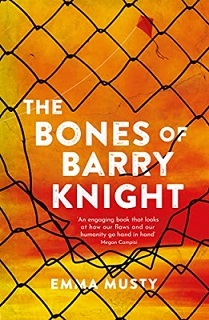Review of The Bones of Barry Knight, by Emma Musty, pub. Legend Press 2022

This is a multi-narrator novel in which the various speakers are all converging on one point, a refugee camp. Seven-year-old Saleema lives there; Amanda works for a charity partly responsible for its running; ageing rock star Barry is hoping to resurrect his career via a well-publicised visit there; journalist Ana is pursuing an investigation into both him and the charity, while Sol and Omar have connections with people already there and are going for their own personal reasons.
All the narrators are believable; some, inevitably, are more engaging than others – Saleema, the lively, curious child, especially so. She and her friend Noor have aged prematurely and known too much tragedy, but they are still children:
“even though it is too hot to do this and we are nearly too old for such childish things, suddenly the very feeling of running is everything. My body wakes up as we take a corner too tight and have to jump a tent peg, leaving adults shouting in our wake. ‘Where are we going?’ I scream after her and she briefly turns to me and then starts laughing as she runs, like it’s the funniest thing I’ve ever said, or she’s ever heard. ‘Are you crazy? We’re not going anywhere! We’re just running because we can!’ And then I start laughing too, because of course we’re not going anywhere and because the running feels good and then we collapse in the shade of the big tent for the kids with no parents, but round the side, where no one else can see us. I can hear my mother’s voice; she’s telling one of them off for making a mess, and I can tell from the tone of her voice that she doesn’t love them more [than me]. For a moment, everything feels lighter.”
Amanda, troubled by the impossibility of keeping clean hands in a situation where helping people also involves turning a blind eye to bribery and corruption, has developed a cynical edge that individualises her voice:
“the governments think that the camps should be worse, potentially with no toilets at all, so they don’t create a pull factor, as if having an adequate number of toilets will bring thousands running – ‘Have you heard, in the camp a little further north they have loads of toilets!’ ‘Praise be to God, we must leave everything and go there now!’”
And Barry, who for most of the book has little enough to recommend him as a human being, nevertheless has a degree of self-awareness and sense of humour that render him rather more likeable than one might expect, particularly when he gets to the camp and shows more sense of fitness than the staff:
“She says we’ll start with a little tour, like we’re in some sort of bloody theme park or on safari. I almost make a joke about looking forward to seeing the hippos, but I stop myself, and congratulate myself a little for doing so.”
Sol and Omar I found slightly less engaging than the others; Amanda’s acid description of Omar as “righteous” is on the money, and though phrases like “How can any of us move forward without first examining our past, understanding our present and looking towards making our future a better place?” are believable from him, they do not endear him to a reader. By and large, the multi-narrator strategy does not create undue problems in keeping up with the story; we always know more or less where we are. Now and then, one comes on a name or detail mentioned earlier and thinks “who or what was that?” – but that is what second readings are for.
Tension builds up gradually through the novel, until everyone arrives at the camp, when both the speed and tension of the narrative really take off. The ending, even though it is foreshadowed in the prologue, and hinted at in later chapters, is still capable of surprising a reader; I think because these characters have all become quite well known to us, and unlike Saleema we have not needed to absorb the fundamental truth she voices when remembering her father:
“I remember how it felt when he smiled at me with his hope all over his face and I knew I didn’t have to worry about anything and that he would keep me safe. And then they took him away and put him in prison, and then they killed him, and then he was dead, and that is how sudden life is, and how sudden death is.”
This is very much a novel about contemporary political issues, specifically what sometimes gets called the “refugee crisis”, which appears in novels less often than one might expect. But fortunately, it revolves around believable people, without whom no issues can long engage a reader. The writing is assured and has that credibility which convinces one that the writer knows her subject matter well.



